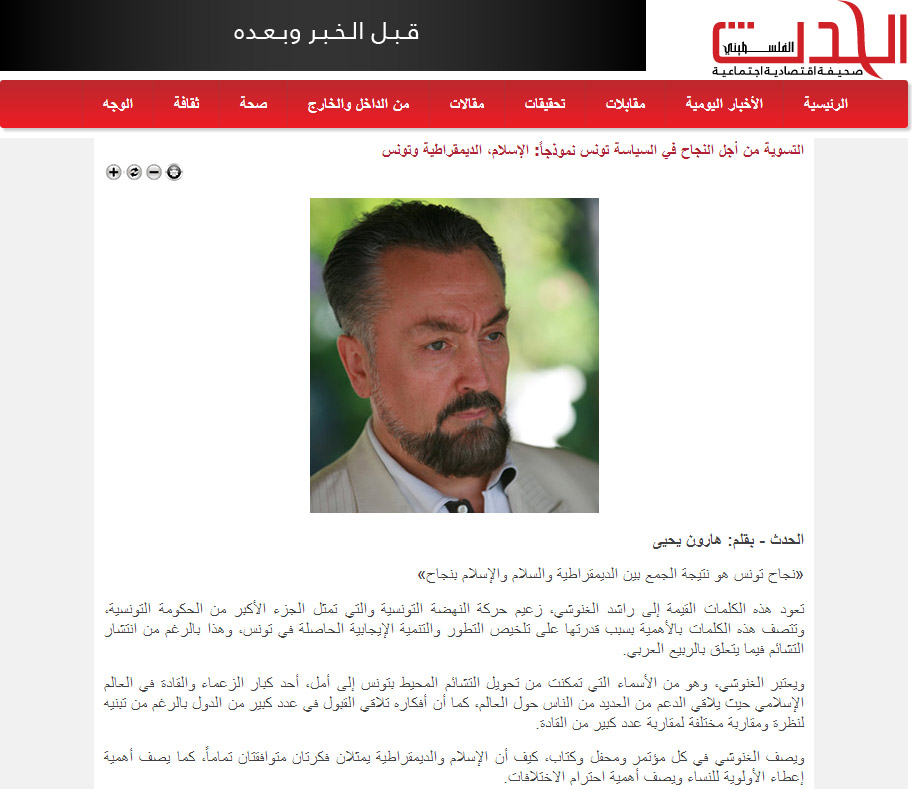
Islam, democracy and Tunisia
“Tunisia’s success is the result of a successful combination of democracy, peace and Islam.”
These words belong to Rashid al-Gannushi, the secretary of the Ennahda Party, the largest partner in the Tunisian government.
They are important because while there are many pessimistic notions concerning the Arab Spring floating about, these words nicely summarize the reasons for the positive developments taking place in Tunisia.
Gannushi, who is one of those names that turned pessimism over Tunisia to hope, is a major religious leader in the Islamic world and is supported by many across the world. His ideas are accepted in many countries, although he adopts a different line to many religious leaders.
Gannushi describes at every available opportunity, in conferences and in books, how democracy and Islam are compatible, how a priority needs to be given to women and how important it is to respect differences.
One important piece of evidence of his sincerity on this is the fact that he has put his ideas into action in Tunisia. For example, he recommended a secular liberal democrat, Munsif Marzuki, for the presidency, and while he had enough votes to govern alone he made a proposal to the opposition, suggesting that they “build a government together,” to solve the political crisis.
In essence, the Ennahda Movement revealed the importance it attached to democracy by bringing in a liberal as president and someone with leftist views as the speaker of the Parliament.
Gannushi says, “Mosques and beaches in Tunisia are open to all,” and despite being regarded as “irreligious” by some people because of these ideas, he has maintained his conciliatory behavior and has been instrumental in preserving stability in Tunisia to date.
Much has been written and said about Tunisia, but predictions for the future have always been pessimistic.. Yet fine things have happened in Tunisia, disproving some people’s expectations.
The main factor in developments proceeding well is the partners in the government being determined to democratize and their being open to dialogue with all parts of society.
Although there are ideological differences between the government and the opposition in Tunisia, there is a constant link between them. That link and the search for agreement on all subjects are the main factors to increase the optimistic expectations in Tunisia.
Our Prophet’s (saas) successful solution: “Consultations in government and avoiding conflict”
Using rational methods, Ennhada, one of the ruling partners, shows it is on the side of democracy at every opportunity. For example, Ennahda gradually compromised on some of its ideas it imposed at first, and that played a major role in establishing progress. Ennahda's embracing all sections of society and emphasizing it adopts a dramatically different stance to that of radical Islamists has thwarted those who wished to spread confusion.
One of the main criticisms of Ennahda was that it needed to give minorities the right to speak up in line with their political objectives. Although Ennahda won an overwhelming majority in the elections, it rebutted those criticisms by granting rights to minorities.
The problem in Tunisia is that the majority of people are not acquainted with Ennahda, and some regard it as a radical movement that uses the name of Islam. What therefore needs to be done is to tell people that it is the exact opposite and to win the people over by stressing the party’s compromising, peaceable, democratic and moderate nature and how it is open to consultations.
The Constitution was passed and came into effect last month. This was a great achievement, because the legislators made a specific effort to address the sensitivities of all opposition groups in Tunisian society. The Tunisian Constitution is of great importance as the first Constitution produced in the wake of the Arab Spring in terms of receiving the support of all sections of society.
Many people agree that this Constitution is important in terms of ensuring the coexistence of different groups within society.
Not all the subjects of disagreements in Tunisia have yet been overcome: One of the most important of these is the disagreement on the subject of women’s rights and gender equality. However, it does seem that an agreement on these issues will be possible, because people from different sections of society are discussing matters of disagreement at length and are able to express their wishes. In other words, democracy is working.
Political crises can be resolved by peaceful means, no matter what. That is what common sense, structures open to compromise and political maturity demand – just like the solution proposed by our Prophet (saas) of “consultations in government and avoiding conflict.”
To “thwart stratagems”
This is a classical phenomenon. When an Islamic country starts making economic and political progress, when it enjoys good relations with its neighbors and exhibits progress, some circles start to feel uneasy. They will try to halt that progress through various stratagems, just as we see happening in Turkey, where democracy and Islam coexist in harmony.
However, we have the ability to thwart these stratagems and maintain progress. We can thwart these plans by moving ahead in unity, contrary to what those who want division and fragmentation desire.
For example, the excellent developments in Tunisia also being supported by Turkey can lead the way for other Arab countries, particularly on the subject of trade and enjoying closer relations.
Muslim countries becoming stronger, politically and economically, their living by democracy and the building of peace are therefore very important. These will all be instrumental in internal conflicts coming to an end and in achieving social peace, and thus to the start of good relations with their neighbors.
Turkey collaborating with countries such as Iran, Iraq, Saudi Arabia and Libya, and the use of capital, scientific means and technological infrastructure for common purposes can also help accelerate this union.
Mr. Adnan Oktar's article on Al Hadath:
http://www.alhadath.ps/ar_page.php?id=1pQ8NWPyG0a280545ARlkksEeHAE#sthash.dZYFFknO.bDKnWbMh.dpbs


